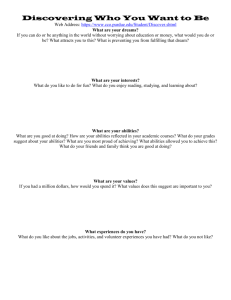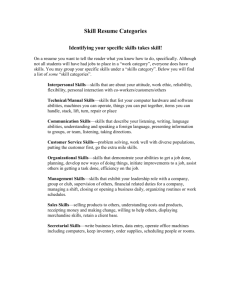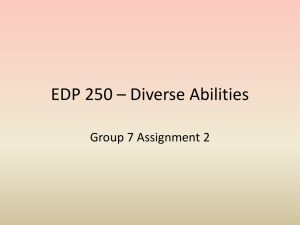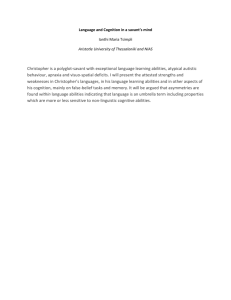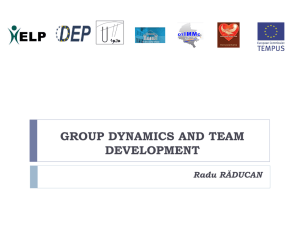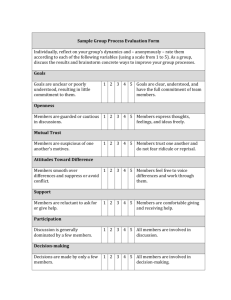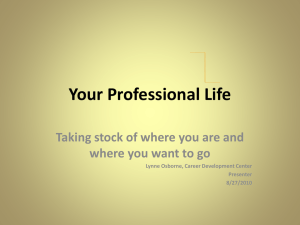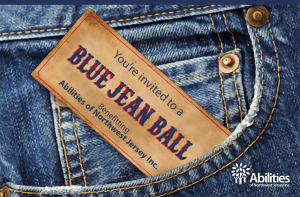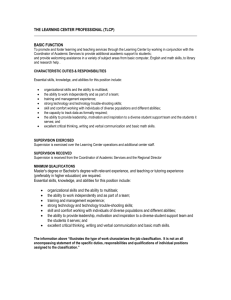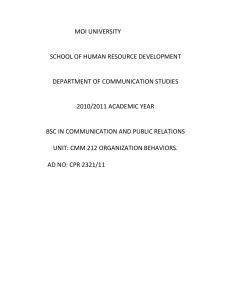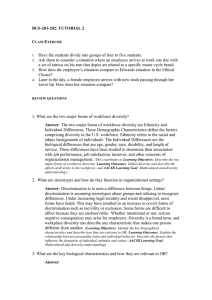Life Skill Education
advertisement
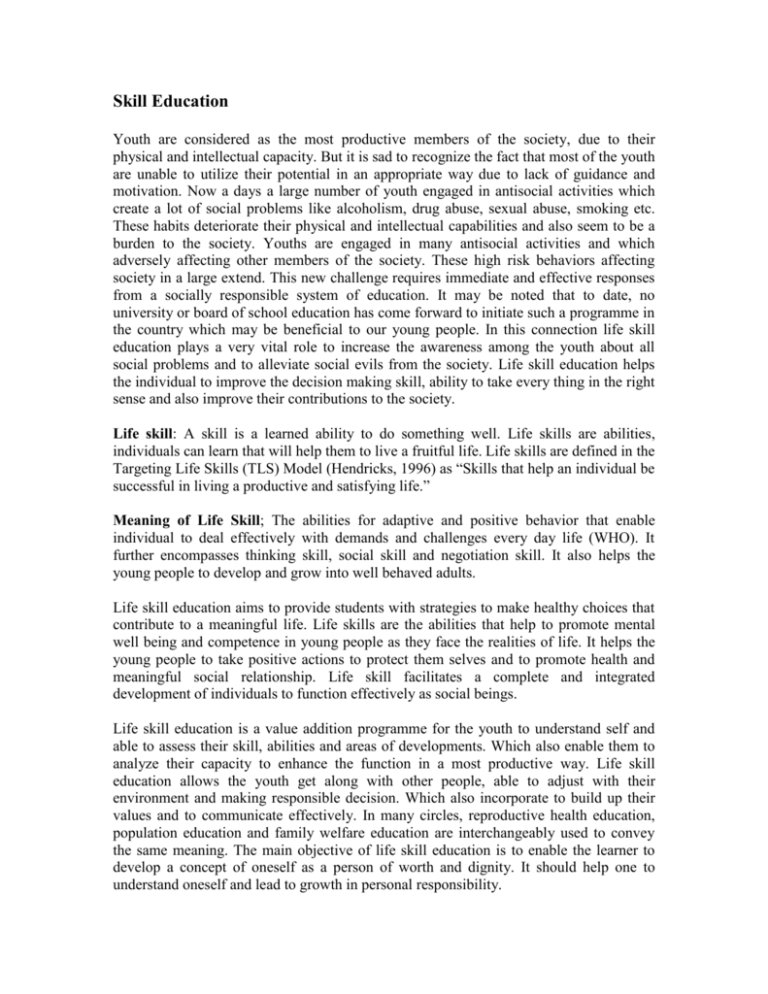
Skill Education Youth are considered as the most productive members of the society, due to their physical and intellectual capacity. But it is sad to recognize the fact that most of the youth are unable to utilize their potential in an appropriate way due to lack of guidance and motivation. Now a days a large number of youth engaged in antisocial activities which create a lot of social problems like alcoholism, drug abuse, sexual abuse, smoking etc. These habits deteriorate their physical and intellectual capabilities and also seem to be a burden to the society. Youths are engaged in many antisocial activities and which adversely affecting other members of the society. These high risk behaviors affecting society in a large extend. This new challenge requires immediate and effective responses from a socially responsible system of education. It may be noted that to date, no university or board of school education has come forward to initiate such a programme in the country which may be beneficial to our young people. In this connection life skill education plays a very vital role to increase the awareness among the youth about all social problems and to alleviate social evils from the society. Life skill education helps the individual to improve the decision making skill, ability to take every thing in the right sense and also improve their contributions to the society. Life skill: A skill is a learned ability to do something well. Life skills are abilities, individuals can learn that will help them to live a fruitful life. Life skills are defined in the Targeting Life Skills (TLS) Model (Hendricks, 1996) as “Skills that help an individual be successful in living a productive and satisfying life.” Meaning of Life Skill; The abilities for adaptive and positive behavior that enable individual to deal effectively with demands and challenges every day life (WHO). It further encompasses thinking skill, social skill and negotiation skill. It also helps the young people to develop and grow into well behaved adults. Life skill education aims to provide students with strategies to make healthy choices that contribute to a meaningful life. Life skills are the abilities that help to promote mental well being and competence in young people as they face the realities of life. It helps the young people to take positive actions to protect them selves and to promote health and meaningful social relationship. Life skill facilitates a complete and integrated development of individuals to function effectively as social beings. Life skill education is a value addition programme for the youth to understand self and able to assess their skill, abilities and areas of developments. Which also enable them to analyze their capacity to enhance the function in a most productive way. Life skill education allows the youth get along with other people, able to adjust with their environment and making responsible decision. Which also incorporate to build up their values and to communicate effectively. In many circles, reproductive health education, population education and family welfare education are interchangeably used to convey the same meaning. The main objective of life skill education is to enable the learner to develop a concept of oneself as a person of worth and dignity. It should help one to understand oneself and lead to growth in personal responsibility. Life skill education is a basic learning need for all young people. It will help the young people to empower in challenging situations. Various skills like leadership, responsibility, communication, intellectual capacity, self esteem, Interpersonal skill etc.extends its maximum level, if it is practicing effectively among the youth. We need to create life skill education as the cornerstone of various youth programmes. An effective implementation strategy will help the youth to practice it in their life. Specific activities like leadership training, communication, interaction, understanding self, making decisions, working with groups, socialization etc added the quality of youth. Developing life skill helps the adolescents to translate knowledge, attitude and their health behavior such as acquiring the ability to reduce specific risk behavior and adopt healthy behavior that improve their lives in general. Life skills have produced the following effects: lessened violent behavior; increased pro-social behavior and decreased negative, self-destructive behavior; increased the ability to plan ahead and choose effective solutions to problems; improved self-image, self-awareness, social and emotional adjustment; increased acquisition of knowledge; improved classroom behavior; gains in self control and sociability; better handling of interpersonal problems and coping with anxiety; and improved constructive conflict resolution with peers, impulse control and popularity. Skill based approach in life skill education follows well established mentoring techniques to develop students innate quality and also motivating them to adopt socially acceptable pattern of life style’s particularly, strategy consisting of a group of people combined together to help themselves by identifying their talents and directing them to choose an appropriate steps to enhance their skill and abilities as a part of development. Proper feed back are necessary from the trainer as well as the peer groups to an individual to improve their confidence. Through the experiential learning process, youth internalize the knowledge and gain the ability to apply the skills appropriately. Life skill education Strategies Life skill covering the areas like leadership, ethics, accountability, adaptability, personal productivity, personal responsibility, people skill and self direction. Leadership skill enables the person to solve problems, attain his/her life goal and the ability to motivate others and also achieve a common goal. Person will meet the high standard of accomplishments by following the ethics in his/her personal as well as professional life. He will be able to adapt different roles and responsibilities. They are able to tolerate ambiguity and willing to change their priorities as per the requirement. Thus they will be committed to their work by utilizing the time more effectively. Life skill education will be effective only when people are able to act upon the skill which they have learned. In mental health and other areas, there is a considerable improvement in behavior with the help of life skill education. Life skill education lays the foundation for learning skill, which is greater demand in job market. Life skill education enhances self direction of the individual. He/She will be able to monitor his or her own understanding and learning needs. And also has the commitment to learning as a life long process. A life skill programme could include content about friendships, bullying, sexual relationships, anger management, perceptions about drug use. The Key basic categories of life skills including communication, negotiation, refusal skills, assertiveness, cooperation, empathy. Cognitive skills including problem solving skills, understanding consequences, decision making, critical thinking, self evaluation. Emotional coping skills including managing feelings self management and self monitoring. In order to have an effective implementation of life skill education there is a need for professionally trained and skilled personal from within the country. Professional training requires a purposely planned programme of study prepared by experts which has the approval of a competent authority. There is an urgent need to train and prepare a large contingent of “trainers of trainers” (TOTs). The TOTs will require adequate training on all aspects of the subject. They have to be expert in this field of study in order to be effective in performing their task. Through life skill education one can move towards a more positive and holistic approaches in order to educate the new generations and through them the future generations. References: • World Health Organization. Life skills education: planning for research. Geneva, WHO, 1996. 72 p. http://4hembryology.psu.edu/lifeskills.html • http://www.21stcenturyskills.org/index.php?option=com_content&task=view&id =266&Itemid=136 • http://www.unicef.org/lifeskills/ • http://www.aidsconsortium.org.uk/Education/Education%20downloads/life_skills _new_small_version.pdf • http://www.unicef.org/teachers/teacher/index.cfml Prepared By Margaret Francis, MSW, M.Phil,PGDCIM, Social Worker and Counselor registered under GSCC, UK
